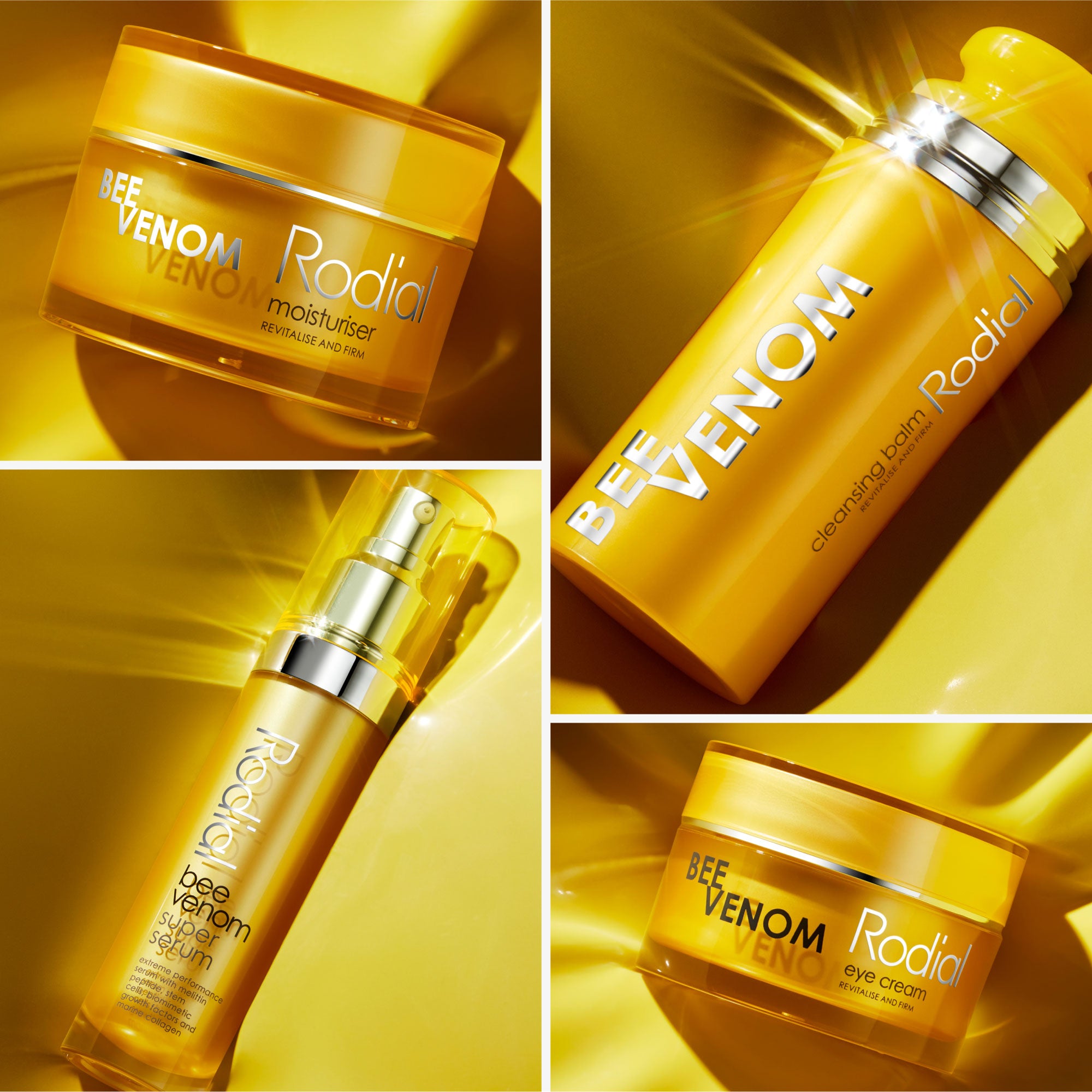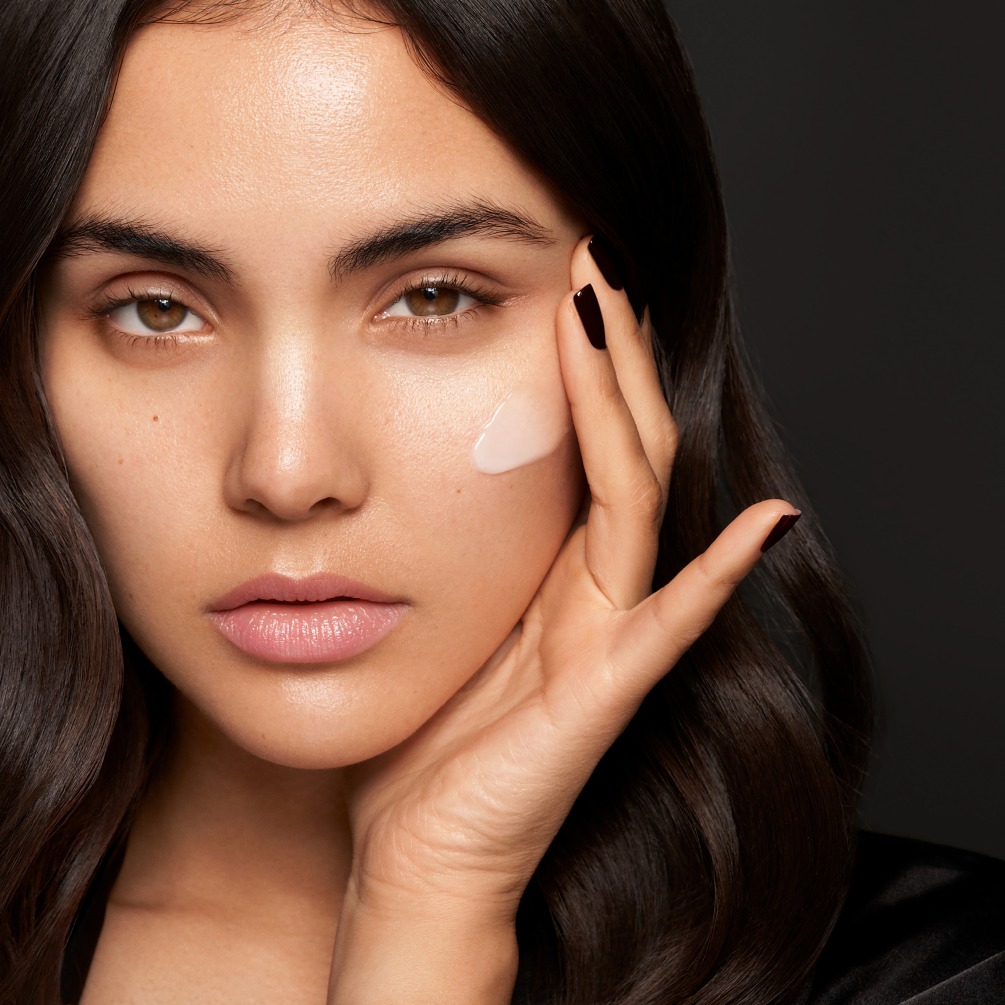It’s the range you want to be stung by. We’re celebrating a decade of our groundbreaking Bee Venom range and all its skin-firming, anti-ageing benefits.
When we launched it back in 2013, Bee Venom was heralded as able to "halt the damaging effects" of the menopause on skin. And with 70% of women over the age of 40 wanting more personal care products suitable for use in perimenopause and menopause*, there's never been a better time to create a buzz about Bee.
Is bee venom good for your skin?
When creating the range, our founder Maria was inspired by the effects of bee venom – the rush of blood to the skin's surface resulting in plumpness and swelling – and how a range could mimic these effects to visibly plump, firm and reduce wrinkle depth in ageing skin, as well as in skin experiencing the effects of hormone changes related to the menopause, such as loose, crepe-like skin.
Bee venom as a skincare ingredient essentially ‘tricks’ the skin into thinking it’s been stung: your body reacts by increasing blood flow to the area, and collagen and elastin production is stimulated by active compound mellitin, which has a plumping effect. User trials on our range back in 2013, conducted on women aged between 50 and 59, revealed benefits including improved skin texture, reduced appearance of lines and wrinkles and "more youthful" skin.
Is bee venom safe for your face?
Since bee venom emerged as a skincare ingredient in the 2010s, extensive research has been carried out on bee venom and the effects on skin. Fortunately, there are no major side effects, although people who are allergic to bee stings should avoid bee venom products, as well as those who are pregnant, as there is no way to know if your baby may have an allergy to bee stings.
Does bee venom increase collagen levels?
Yes – bee venom is known to boost collagen production. It does this firstly by tricking the skin into thinking it’s been stung, which increases blood flow to the area. Active compound melittin then boosts collagen levels – the substance responsible for keeping our skin plump and youthful – as well as elastin, which gives skin its elasticity. Increased levels of both substances help generate new cells, which aids in plumping out fine lines and wrinkles.
Does bee venom plump skin?
One of bee venom’s main benefits is its ability to plump skin. The increased blood flow to the area when applied in a cream or a serum stimulates collagen production via active compound melittin, which in turn plumps skin. As we age, collagen levels deplete: to maintain that plump, youthful look, it’s essential that we use ingredients that either contain collagen or ingredients known to stimulate collagen production, like bee venom.

Does bee venom make you look younger?
Due to the fact bee venom stimulates the production of substances in skin that are responsible for keeping it youthful and supple, bee venom is regarded as having positive anti-ageing effects. While there is no ingredient that will truly turn the clock back on skin, using ingredients like bee venom ensure that skin can look youthful as possible for as long as possible. In our 2013 study we conducted on users back when we first launched our range, reported benefits included improved skin texture, reduced appearance of lines and wrinkles and "more youthful" skin.
Can you use bee venom and retinol together?
These two powerhouse ingredients are known to have anti-ageing effects. They both encourage and support collagen production, with retinol known as a ‘cell-communicating ingredient’, meaning it encourages younger cells through the skin to help reduce lines and wrinkles. Both ingredients are suitable to be used together as part of a complete anti-ageing routine – however we always recommend patch testing before use and introducing a new ingredient slowly to your routine.
Which other products can it be used with?
Bee Venom is a great ingredient to introduce to work in synergy with other ingredients for a well-rounded skincare regime. Our Bee Venom range contains ethically sourced bee venom (so no bees are harmed in the extraction process) as well as a host of other skin-boosting ingredients. Many products in the range, like the Bee Venom Cleansing Balm, Bee Venom Moisturiser, Bee Venom Eye Cream and Bee Venom and Placenta 24 Carat Gold Ultimate Crème contain vitamin C, which works to brighten skin and correct sun damage, as well as P-cell, which boosts skin’s elasticity, and skin-plumping marine collagen.
What are the side effects of bee venom?
Tests on bee venom in skincare haven’t indicated any side effects beyond mild stinging and mild irritation – we always recommend patch testing before use when introducing a new skincare product or ingredient to your routine. However, if you are allergic to bee stings, you should avoid using bee venom in skincare.

Shop Now
*2019 AARP online survey conducted on 1,992 women.


